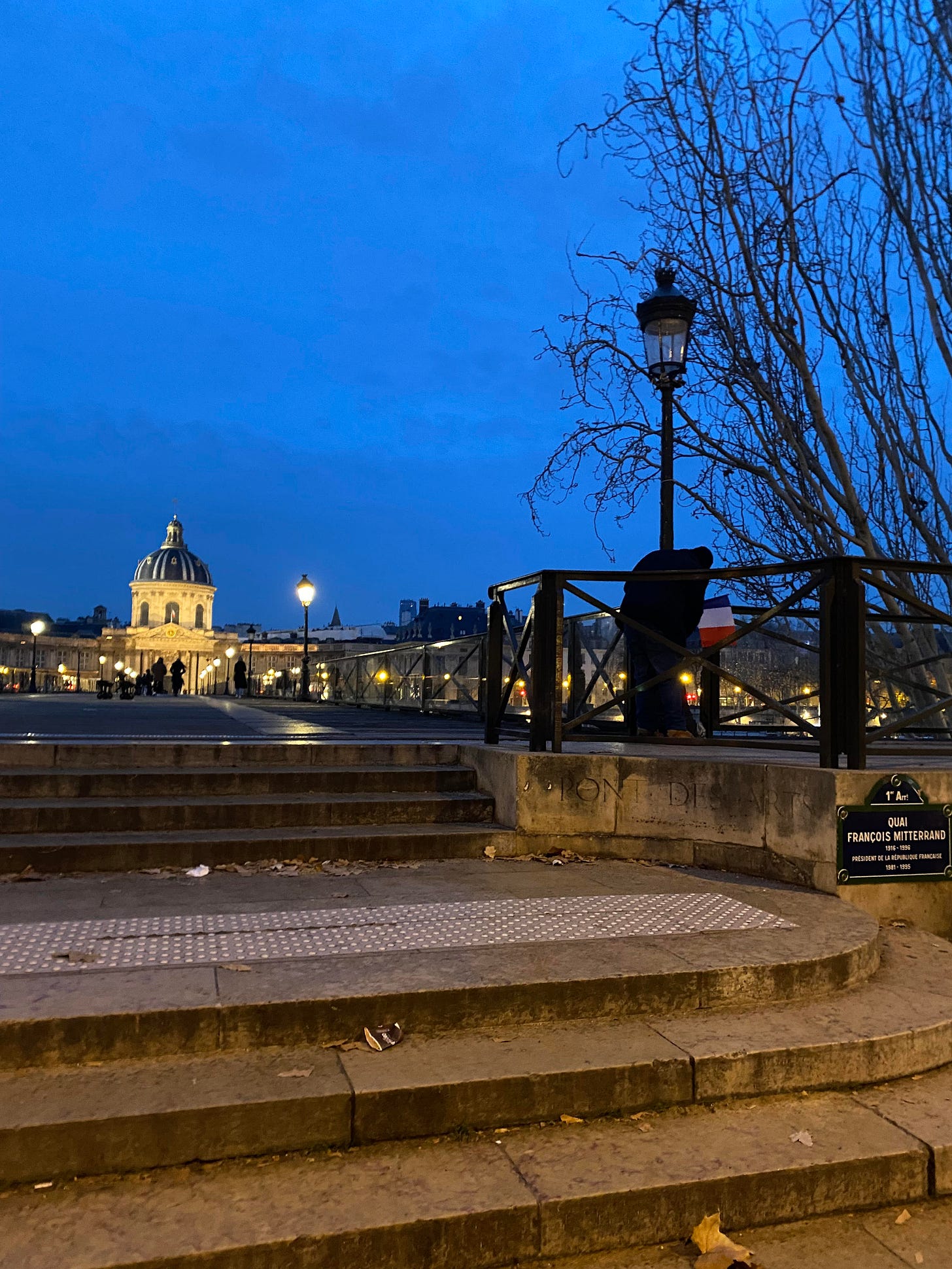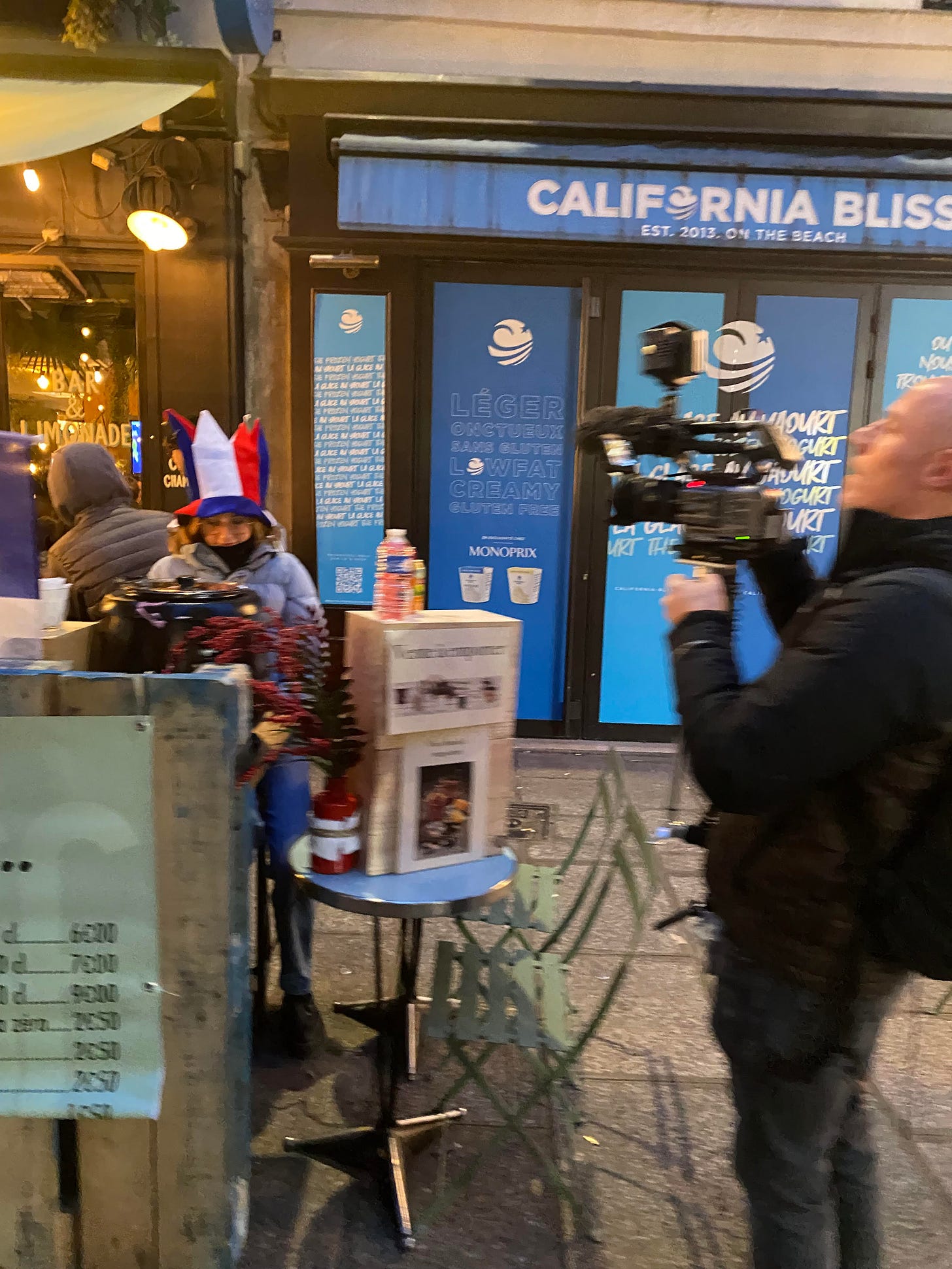Dear Friend,
I hope you’ve had a good week. If this is your first letter, I’m delighted to have you here!
I’m writing to you from a very cold, very disappointed Paris. It’s freezing outside and the French national team have just lost the World Cup final in a toe-to-toe match that felt at one point like it was going to go on forever.
Tonight was a huge contrast to the last World Cup final. When France won in 2018, it was a very hot and sticky July day in Paris and I watched standing outside a packed bar near the Canal Saint-Martin. After France won, Parisians jettisoned their usual reserve and self-consciousness and did all kinds of whooping, chanting, dancing and also an odd ritual that involved sitting on the ground in a row and passing someone backwards over their heads.
This evening, as France came back from nowhere thanks to Mbappé, I was cycling through a cold and rainy Paris and for a brief moment the atmosphere was as elated and febrile as last time, with car horns honking left, right and centre. But it was not to be.
Here are some photos I took this evening, which I think capture the mood in one way or another:
I was also amused by President Macron’s decision to comfort Kylian Mbappé on the pitch. Presumably the two famous French men have only met a handful of times and in a professional context. It doesn’t look like a cuddle with the president was what the player wanted at that moment. Meanwhile, Macron looks a bit like he is trying to charge himself up (in popularity?) from Mbappé’s head.
“Maghreb United”
While this final was undeniably a dramatic game of football, I was much more interested in the France vs. Morocco match earlier this week, which was surrounded by a really particular and interesting atmosphere. It was a match between France and one of the countries it once controlled in North Africa, along with Algeria and Tunisia.
After the decline of the Ottoman Empire, France began conquest of Algeria in the 1830s, marking the start of a period of political and military dominance that would last all the way up until the early 1960s. For most of this time, the French considered Algeria to be actually part of mainland France, an extension of French soil simply separated by the Mediterranean. Many French settlers went to live there, enjoying rights and powers that native Algerian population were denied. At the turn of the 20th century, France expanded out into Tunisia to the east and Morocco to the west.
From the 1960s, after the country’s independence, many Moroccans started coming to France on the promise of greater economic opportunity and integration into society. However, the reality for many was low-paid manual work, racist attitudes and a two-tier social system a bit like the one that characterised French colonisation. The inequality between European French people and French people of Moroccan, Tunisian and Algerian origin is still seen and felt today, though it is difficult to quantify with accuracy for the reason I’ve written about before, that the French state doesn’t allow the collection of statistics about race and religion.
In this context, the Moroccan team’s trail to the semi-final and facing France was full of symbolic meaning for many people here. On French public radio, I heard one journalist say that the Moroccan team was being affectionately called “Maghreb United” because it was acting as a kind of proxy for not only its North African neighbours, but also other French-speaking African nations like Cameroon and Senegal.
Like the France of today, it’s a complex and multicultural picture. The Morocco manager, Walid Regragui, is a dual Moroccan-French national who grew up in Corbeil-Essonnes, a southern suburb of Paris. In a press conference, he expressed a sense of solidarity between the Moroccan and French sides:
FR: “J’ai la double nationalité, c’est un honneur et un plaisir de rencontrer la France.”
EN: “I have dual nationality and it’s an honour and a pleasure to meet the French side [in the semi-final]”.
Morocco’s players Sofiane Boufal and Romain Saiss also grew up in France and were playing for their family’s country of origin. Though Morocco lost the match, it was clear to see that there was a special bond between their team and the French side, many of whom have dual or multiple heritages. Mbappé, for example, is from Bondy, a suburb out to the northeast of Paris, and is of mixed Cameroonian and Algerian heritage.
On the day of the match I made my SECOND feature on talkSPORT in less than a week (!!) to talk about the atmosphere in Paris ahead of the game. You can listen below around the 20-minute mark.
Thirty-second book club
I finished reading Regarde les lumieères mon amour (Look at the lights, my love), Annie Ernaux’s quietly moving and thought-provoking ode to the micro-culture of low-cost, suburban supermarkets.
Nobel-winning Ernaux has written before about her complicated relationship with class. She grew up in a working-class part of Yvetot, Normandy, and through her work and talent became a lecturer and esteemed French writer, the toast of Parisian bourgeois society. I admired the way, in this book, she chose to illuminate a part of French life left for the most part unexamined, thoughtfully giving shape and voice to the people, very often women and mothers, who do their shopping in these ‘hypermarchés’ that most Parisian politicians will likely never set foot in.
I really liked a little section where she talks about an interaction she has with an older woman in the Auchan supermarket in Cergy.
FR : Là, une petite dame qui regarde des boites de sardines se tourne vers moi, elle rit : “Les sardines au piment c’est pas pour moi !” Je luis souris en retour … ces désirs de communication qui me sont adressés par des inconnus me touchent inexplicablement.
EN: Then, a small lady who’s examining at the cans of sardines turns towards me and says laughing: “Sardines with chilli spice! Not for me, that one!”. I smile back at here … I find these inexplicably touching, these little interactions with strangers, who just want to talk.”
A few pages on, she notices how it is always in the pets aisle that people feel most encouraged to talk and comment to strangers. I thought immediately of an interaction I had earlier this week up by the Sacré-Coeur on my early-morning dog walk. I was standing with my dog contemplating the view when a small lady, around 80, tapped me gently on the elbow.
“Attention, madame” she said, nodding towards my dog. “Look out for the police, with a dog like that…”. I was puzzled, opening my mouth to ask if this spot had become one of the many points in Paris where dogs aren’s allowed. Before I could speak, the lady hit me with her punnchline: “Oui, attention madame, your dog is COMPLETELY NAKED!!”. She chuckled enthusiastically at her own little prank and her bright blue eyes glistened in the winter sun.
I then realised this wasn’t my first-encounter with the quippy octogenarian. In 2020 during the first lockdown, she also hit me with her two-part routine. At the time, we needed to fill out a special certificate to leave the house, and mask-wearing was mandatory. I was walking my dog up the same hill and was in the same spot and I’d been tapped on the elbow in the same way.
“Attention madame,” the lady had said. “Attention à la police !”. Just when I was about to express my anxiety she said. “Votre chien ! She is not wearing her mask!”. She chuckled to herself in the same way she did this week, and then sauntered off on her merry way. And both times it was indeed inexplicably touching.
Thank you for reading! I will not write next Sunday, for festive reasons, but hope/aim to write at some point between now and the new year.
Thank you very much for being my Pen Friend over the last few months. I have some more plans for our letters in 2023 and hope you will enjoy our continued correspondence.
If you enjoy these letters and wish to offer me a festive present, please like this post and share it with someone you know or on your social networks. I’d love that!
I’ll write soon! Until then Happy Hanukkah and Merry Christmas!
Yours,
Hannah









